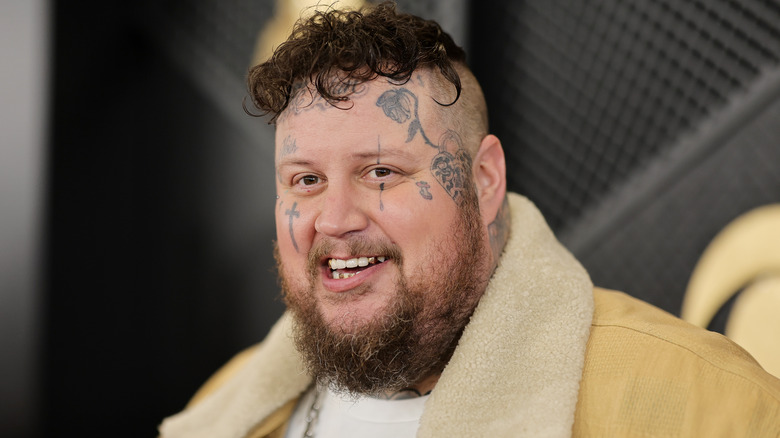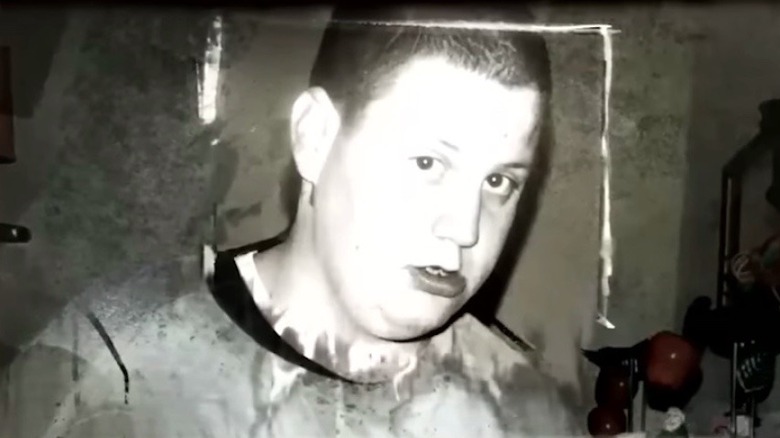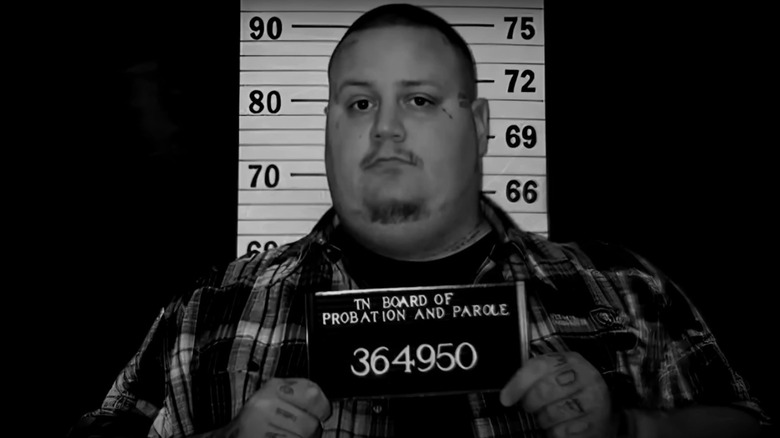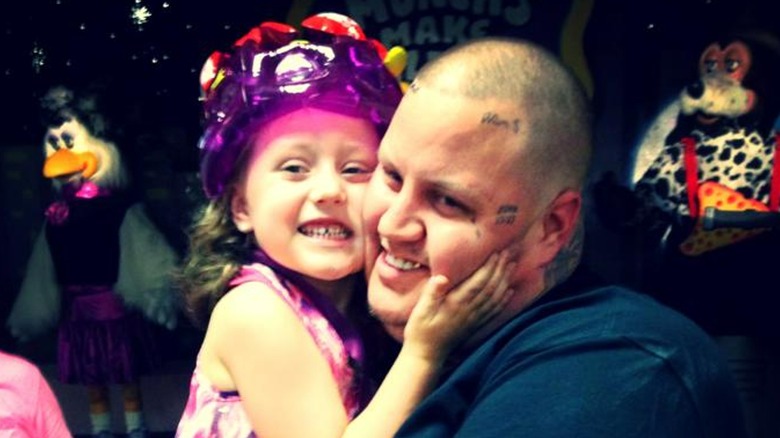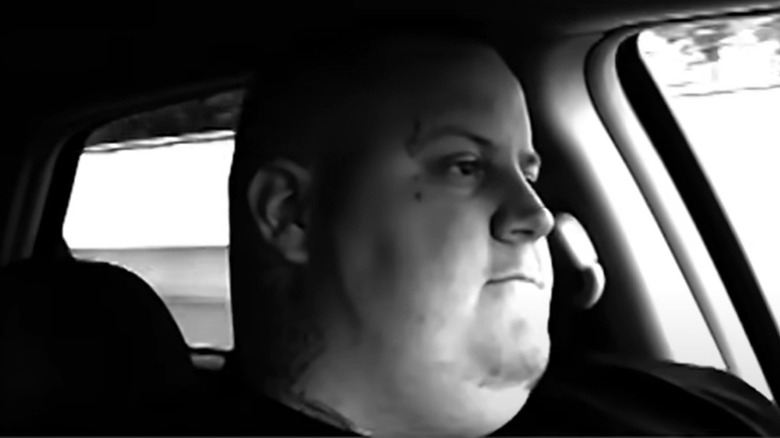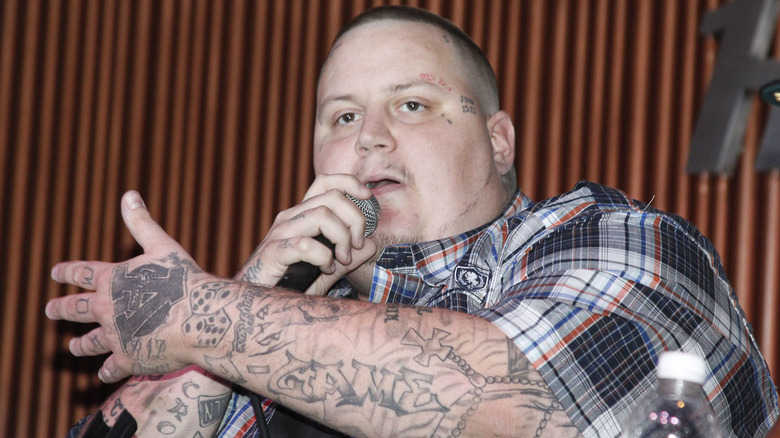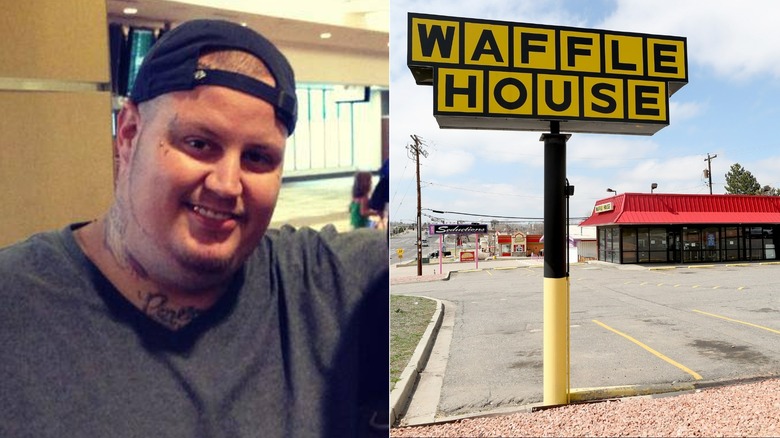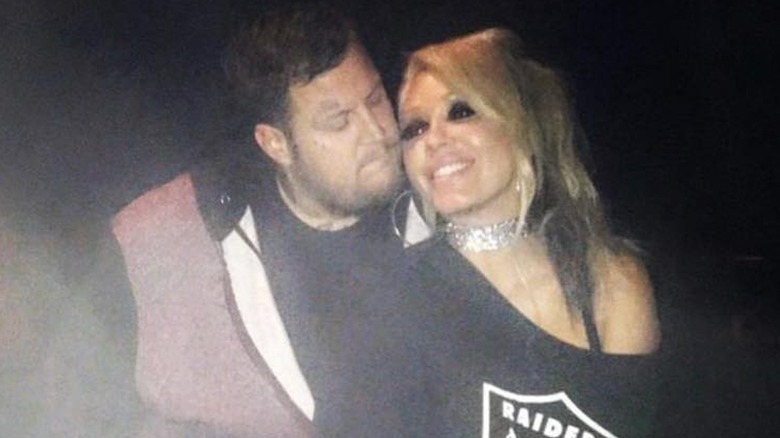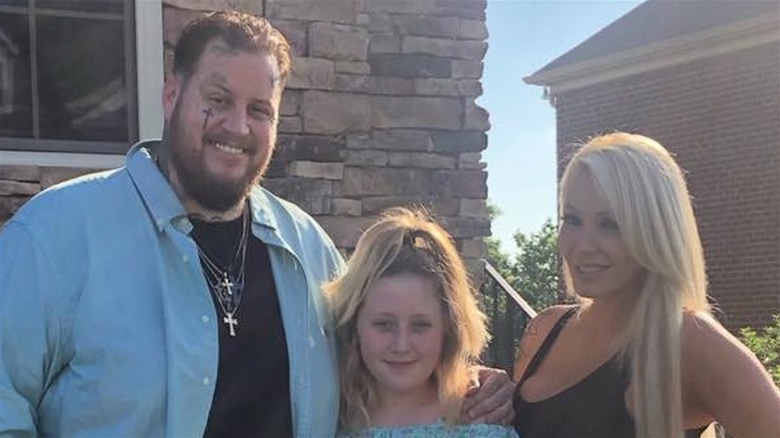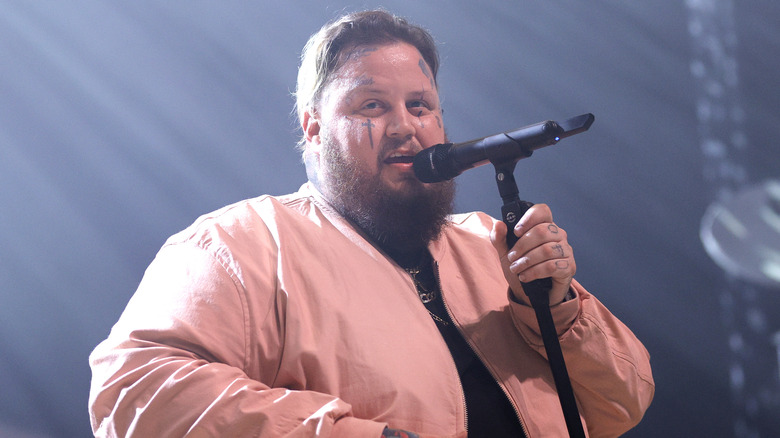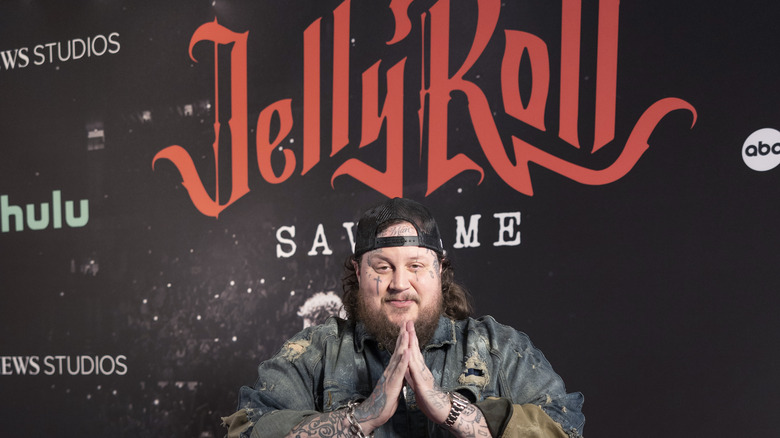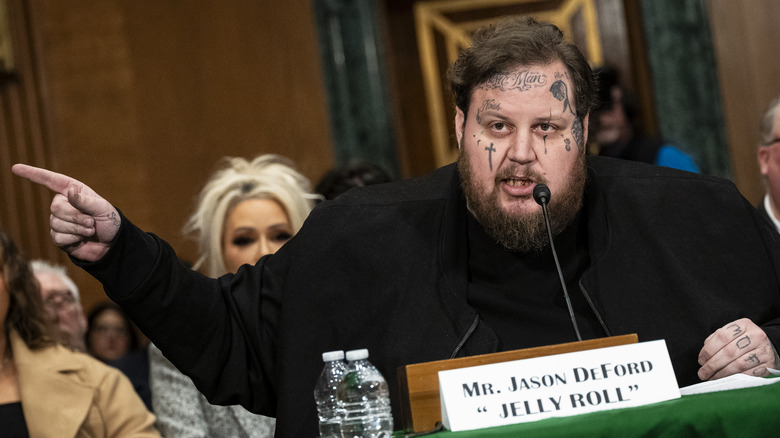The Stunning Transformation Of Jelly Roll
The following article includes mentions of addiction.
Originally named Jason DeFord, these days the Nashville native is better known as Jelly Roll, one of the hottest stars in the world of country music. Seemingly emerging out of nowhere, Jelly Roll has experienced stratospheric success in a remarkably brief amount of time, rising from a little-known rapper to a multiple award-winner whose singles and albums have topped the charts.
His first album on a major label, 2021's "Ballads of the Broken," put Jelly Roll on the map. But it was his second, "Whitsitt Chapel," that cemented his stardom, leading him to walk away with multiple statues at the CMT Awards and the ACM Awards, even earning two Grammy nominations. For those who know his origin story, though, his rise to the peak of the music world is nothing short of miraculous, especially when considering the seemingly impossible obstacles he's had to overcome to get where he is now.
Jelly Roll is living proof that no matter how bad things might seem, the possibility of redemption is always somewhere on the horizon. "The windshield is bigger than the rear-view mirror for a reason," he mused in a 2024 interview with "CBS Sunday Morning." "Because what's in front of us is so much more important than what's behind us." His journey is as fascinating as it is inspiring, and it's only just beginning.
Jelly Roll endured a difficult childhood
Born Jason DeFord in Antioch, Tennessee, he was nicknamed Jelly Roll by his mother at an early age, and the moniker stuck. "If somebody walked in here right now and said, 'Jason,' I wouldn't look up," he explained to "CBS Sunday Morning." In that interview, the singer conceded that his childhood didn't exactly prepare him for stardom, but neither did it open the door to a typical nine-to-five, white-picket-fence future. His father sold meat and earned extra cash being a bookie, as his mother experienced issues with addiction. "I knew my father booked bets. I knew my mother struggled with drugs. So, to me, this was just what you did," he explained.
Meanwhile, his weight and his ragged clothing made him the target of mockery at school, but Jelly Roll sought solace in rap music. However, he never envisioned music being something that someone like him, from his humble background, could ever pursue as a career. "I love when artists are like, 'I dreamed about this since I was 5.' It's like, nah, I didn't," he told The Guardian.
His fortunes, as low as they were, fell even further when he began experimenting with drugs. At age 13, he was nabbed for possession of marijuana and sent to a juvenile corrections facility. That was just the beginning of what would become a pattern of clashing with authority — and then paying the price.
His teenage arrest steered him toward a life of crime
Jelly Roll's juvenile incarceration was sadly a precursor to the next decade of his life, which he would spend in and out of various correctional facilities. When he was 16, he was convicted on an aggravated assault charge; Tried as an adult, he was sentenced to one-and-a-half year in prison. At such a young age, he found that living behind bars wasn't necessarily worse than the life that awaited him when he was released. "Jail was like a high school reunion for me," he related to The Guardian. "You go in there, it's like, 'Oh, you're still here, what's up dude.' The rotating door of the judicial system, it's rough, man."
The feeling of hopelessness he experienced during that period is on display in the emotionally raw lyrics of his hit, "Save Me," in which he begs to be rescued from himself: "I'm a lost cause / Baby, don't waste your time on me / I'm so damaged beyond repair / Life has shattered my hopes and dreams."
Looking back on his assault conviction, Jelly Roll has been consumed by regret. "I never want to overlook the fact that it was a heinous crime," he told Billboard, admitting that things could have gone far worse. "This is a grown man looking back at a 16-year-old kid that made the worst decision that he could have made in life and people could have got hurt," he mused.
His daughter's birth inspired him to turn his life around
A watershed moment occurred for Jelly Roll in 2008, during one of his many stints behind bars, when he was hit with some unexpected news. "A guard knocks on my cell door mid-afternoon during lockdown," he told Billboard. "He goes, 'You had a kid today.' I've never had nothing in life that urged me in the moment to know that I had to do something different. I have to figure this out right now."
Fatherhood pushed Jelly Roll to have an epiphany, struck by the knowledge that he needed to turn his life around — immediately. He took the first step when he decided to use the time he was in a jail cell to attain his GED. "I spent less than 60 to 70 days in high school. I thought I was a real dumbass. I thought I was learning disabled," he recalled. However, he realized he had been selling himself short when he passed the GED exam after his first attempt. "I walked in there and smacked that b***h out of the park," he proudly declared.
Looking back, Jelly Roll now sees the birth of daughter Bailee Ann as the most defining event in his life. "It changed everything," he told People, comparing it to the Biblical account of how the apostle Paul was blinded by a divine light while travelling to Damascus. "It was kind of that moment for me," he added.
He overcame his issues with addiction
Becoming a father also led Jelly Roll to back away from drugs. "I didn't have a choice. It was me or them, and I had to learn to love myself," he explained to The Guardian. Admittedly, Jelly Roll's own relationship with drugs and alcohol is complex, in the sense that he has quit harder drugs, like cocaine and opioids, but continues to drink alcohol and smoke marijuana. "I walk the line when I talk about my recovery out of respect for the people that have actually worked the program and completely sobered up," he said, clarifying that he certainly doesn't consider himself a poster child for conventional sobriety.
While Jelly Roll himself never undertook a 12-step program or went to rehab to deal with his addiction issues, he regularly visits rehab centers and juvenile facilities to offer encouragement to others. "I always said that if I ever got in this situation, I would do everything I could to give back," he told People. "The fact that just me showing up places can make people happy is such a gift, and I feel like if God gave me that gift, I should show up."
The musician also recognized there are no absolutes in life, comprehending that conquering addiction is a lifelong struggle, not a one-time thing. "I mean, it still haunts me like the ghosts I know," he said. "But I tell you what, I don't think about doing no drugs today."
He began his musical journey as a rapper
Growing up in Antioch, Tennessee — just outside Nashville — Jelly Roll couldn't help but become aware of the country music that was all around him. However, as a youngster he found himself gravitating to rap music. At the time, he was influenced by the likes of rappers such as Three 6 Mafia, 8ball & MJG, and UGK, and eventually became inspired to write his own raps. In fact, Jelly Roll was 9 or 10 when he composed his first rap song. When he hit the eighth grade, he was producing his own mixtapes that he gave away to other kids at school.
Throughout his various incarcerations, he never lost interest in rap. It wasn't until his daughter's birth that he decided the time had come to make music a serious pursuit and not just a hobby. In 2010, one of Jelly Roll's tracks, "Pop Another Pill," caught some steam in the local rap scene. As he told "CBS Sunday Morning," the song itself was pretty indicative of the state of his self-confidence during that time. "I have a line in that song to show you where I was at in my mental space — how insecure and how much I didn't believe in myself: 'I ain't got no single, no potential for the radio,'" he recalled.
His Waffle House references nearly got him sued
One of Jelly Roll's earliest rap mixtapes was 2013's "Whiskey, Weed and Waffle House," which featured cover art that included a marijuana leaf, a bottle of Crown Royal whiskey, and the logo of Waffle House, the Southern restaurant chain known for its hearty breakfast fare. While Jelly Roll was clearly a fan, Waffle House was not amused and fired back with a cease-and-desist order over the unauthorized use of its logo in the mixtape's artwork.
Initially, Jelly Roll was thrilled by the attention, amazed that someone as obscure as he would manage to cause a ripple big enough for Waffle House to take notice. "I was calling everybody, like, 'We're popular! Waffle House is trying to sue us!'" he told the defunct website Gawker at the time (via Grub Street).
As he said in a statement to Hip Hop DX, he initially took the legal letter he received from Waffle House attorneys to be a prank — until he hired a lawyer, who confirmed it was the real deal. In response, he changed the mixtape's title to "Whiskey, Weed & Women," removing the offending logo. He did, however, find the claim that he defamed the character of Waffle House to be laughable. "This is the mecca of toothless waitresses and tattooed cooks," he responded. "I've never walked in a Waffle House sober in my life, and I doubt you can find many people who have."
Meeting Bunnie Xo changed everything for him
As Jelly Roll slowly built up a following, he began gaining traction, booking bigger gigs, and expanding his fan base beyond the confines of Tennessee. That said, by 2015, he was barely making any money, still an up-and-coming performer who was barely supporting himself. "I was like, touring, living in, like, a '97 high-top Southern Comfort van, and was, like, a**-broke," he said during an appearance on "The Golden Hour" podcast.
It was during this period, while performing at the Las Vegas Country Saloon in 2015, that Jelly Roll met his future wife, Bunnie Xo. "We hit it off," he told Taste of Country. Although she was then employed as a high-priced escort and was in a relationship with another guy, the two experienced an immediate attraction. "I felt her soul," he said. "When I hugged her, I could just feel the genuineness of her. I could tell it wasn't an act."
They remained friendly; When she wound up breaking up with her boyfriend, she invited Jelly Roll to take a break from sleeping in his van and crash on the couch of her posh penthouse condo. Before long, she invited him from the couch into her bed. "It's a white trash love story," Jelly Roll joked on "The Golden Hour." Jelly Roll and Bunnie got married in 2016 and renewed their vows in 2023.
Bunnie helped Jelly Roll get custody of his daughter
Jelly Roll may be a successful music star, but that was far from the case when he first got together with Bunnie Xo. Back then, he was a flat-broke ex-convict — she was the one with money. That dynamic didn't exactly make it easier when, early in their relationship, he confessed that not only did he have a young daughter from a previous relationship, but he had also fathered another baby that hadn't even been born yet (Jelly Roll's son, Noah, arrived in 2016).
Bunnie's money became essential when the couple launched a legal battle to seek custody of Jelly Roll's daughter, Bailee Ann, after her mother had become addicted to heroin. During an appearance on "The Joe Rogan Experience," Jelly Roll shared his admiration for the key role his wife had played in that situation. As he explained, Bunnie didn't hesitate, declaring her intention to help him try to win custody of Bailee Ann regardless of what ended up happening with their relationship. "This woman is like, 'Look, I'm not 100% sure I'll be with you, but I'm gonna do everything I can to help you with this little girl' — because dude, I'm broke," he recalled.
It took a while, but with Bunnie's help, he was able to gain full custody of his daughter in 2017. "I would have never got custody of my daughter without her," he told Billboard. "I wouldn't have had the stability or the money."
His overnight success was years in the making
When Jelly Roll's star began its meteoric rise in 2021, it would be easy to describe him as having come out of nowhere to take over the Nashville music scene. That characterization, however, doesn't account for the decade of hard work that came before that.
When interviewed by The Guardian, the struggle he had endured to eventually get his break into the mainstream was not lost on him. "There's something that's kind of brokenly beautiful about this almost 40-year-old man making his way, you know," he observed. "I'm the real Cinderella man." That hit him even harder in September 2021, when he stepped onto the stage of Nashville's famed Ryman Auditorium for the first time, to rapturous applause. "Boy," he told the hometown crowd. "Y'all made me feel like Garth Brooks tonight!"
The fact that he was pushing 40 before he experienced legitimate fame and had emerged from the rock-bottom of life, gave Jelly Roll a unique perspective on the stardom and success he has achieved. In fact, he told Billboard that he envisioned one day pulling away from music and devoting his time to helping at-risk youth. "Whenever I'm done doing the circus of the music business and I want to leave the carnival and be a normal human," he said. "That's what I'll do."
He captured Nashville's attention performing at the Grand Ole Opry
Having grown up near Nashville, it wasn't until Jelly Roll was invited to play the Grand Ole Opry that he felt that he had been embraced by the country music establishment of the town. In September 2021, Jelly Roll shared a video on Facebook in which a representative from the Opry extended an invitation to perform later that year. In the video, Jelly Roll's eyes widened in surprise as he slowly responded, "You're s***ing me." As it sank in, he placed his hands over his eyes and proceeded to openly weep, wrapping the woman who had invited him in a bear hug.
The Opry later shared a video on YouTube that featured highlights from Jelly Roll's debut on that storied stage. Recalling the moment, Jelly Roll again teared up. "Being invited to play the Grand Ole Opry, for me, is like the ultimate overcoming of everything," he explained. "I represent a group of people that would have never believed that anything like this could happen to anybody like us."
The venue's rich history and all the incredible artists that the Opry has featured over the decades truly made the moment special, but having been born and bred in Nashville made it all the more magical. "It means a lot to me as a musician, but it means just as much to be as a local kid," Jelly Roll added.
He hit No.1, remaining there for a record-breaking 25 weeks
Jelly Roll had made some big inroads into the Nashville country music scene with the release of his major-label debut, "Ballads of the Broken." It was the album's first single, "Dead Man Walking," that really announced that he had arrived. That was clear when the single made its debut in the No. 1 spot on Mediabase's active rock radio chart. Dazed by his own success, Jelly Roll took to Instagram to share his gratitude to the fans who had given him his first-ever No. 1 radio hit. "There is no greater reward for a singer and songwriter in Nashville Tennessee than to have the No. 1 song on country radio," he wrote.
Jelly Roll reflected on the obstacles that he had overcome on his journey to country stardom. "Imagine everyone telling that guy he had no chance at country radio. 'You're too overweight, you have too many tattoos, they will never let another convicted criminal on country radio' — now imagine country radio proving everyone wrong and taking the chance on the song, the message, and the man," he continued.
That single also went to No. 1 on Billboard's emerging artists chart, as did his other songs, "Son of a Sinner," "Dead Man Walking," "She," and "Son of the Dirty South." Combined, those singles placed Jelly Roll in the No. 1 position on that chart for a record-breaking 25 weeks.
Jelly Roll sold out Nashville's biggest arena
While being invited to play at Nashville's venerable Grand Ole Opry registered Jelly Roll's acceptance into the Nashville music community, it was a far bigger venue that proved to be a major turning point. That moment arrived in December 2022, when Jelly Roll sold out Nashville's massive Bridgestone Arena.
For Jelly Roll, the performance was the culmination of a truly extraordinary year, which included his first album on a major label, his first No. 1 radio hit, and his first major concert tour. "No matter how much success we've had this year, even playing Red Rocks, none of it settled on me until we were at home, until that arena was just wall to f***ing wall," he told Hip Hop DX of what it was like to step onstage in front of an estimated 15,000 hometown fans, the biggest crowd he had ever played for. "It was a moment for me."
Before taking the stage, Jelly Roll received an emotional introduction from longtime pal, Shooter Jennings, one of the evening's opening acts. "Tonight we are celebrating the biggest success story in Nashville," Jennings said (via CMT), causing Jelly Roll to tear up for what would be one of many times throughout the night. He ended the show with an emotional performance of his single, "Need a Favor," with a crucifix dramatically lit up behind him on stage as he sang.
A 2023 documentary chronicled his life's journey (so far)
May 2023 saw the release of "Jelly Roll: Save Me," a feature-length documentary from ABC News and Hulu about his journey that took its title from his heartfelt song of the same name. There was much for viewers to take in, given that Jelly Roll had been insistent that filmmakers tell his story truthfully and authentically. That, as viewers discovered, included his 40 stints in jail, ongoing dealing with depression, and history of heavy drug use.
"I mean, we got gritty, we got in the trenches together. We let [the producers] get access to the stuff that artists are afraid to let people get access to," Jelly Roll told ABC Audio. After viewing the finished film, he admitted that he was overcome with emotion watching his life play out on-screen. "I mean, I cried," he confessed. "I cried for like 20 minutes after I watched it."
Putting one's entire history on display, warts and all, is not for the faint of heart, but Jelly Roll saw that as a necessary extension of the raw honesty of his music. "My whole mission in life is to touch people," he explained. "I want to help those that feel helpless because I felt helpless for so long. And I think this documentary is really going to get into the weeds of that."
He testified before Congress to support a fentanyl ban
While Jelly Roll turned his life around when he quit doing hard drugs and vowed not to return to jail, that wasn't the case with many of those with whom he had grown up. "Unfortunately, my friends in Antioch haven't quit dying from fentanyl or are getting locked up or still doing time," he revealed to Billboard, estimating that he had attended 30 friends' funerals, most of which were drug-related.
In January 2024, Jelly Roll used his platform as a music star to shine the spotlight on how many lives fentanyl was continuing to take when he testified before Congress in Washington, D.C. His goal was to encourage the House of Representatives to enact legislation that would decrease the availability of the deadly drug. "At every concert I perform, I witness the heartbreaking impact of fentanyl," he said during his testimony (via The Hill).
Jelly Roll felt he had a particularly unique perspective to impart, given that he had used drugs, dealt drugs, and experienced firsthand the devastating impact upon those who become dependent on them. "I also understand the paradox of my history as a drug dealer standing in front of this committee. But equally I think that's what makes me perfect to talk about this," he noted. "I was a part of the problem. I am here now, standing as a man that wants to be part of the solution."
If you or anyone you know needs help with addiction issues, help is available. Visit the Substance Abuse and Mental Health Services Administration website or contact SAMHSA's National Helpline at 1-800-662-HELP (4357).

